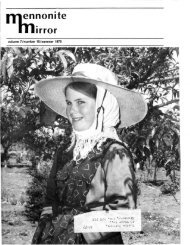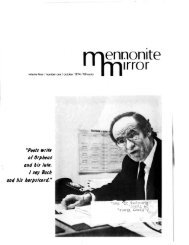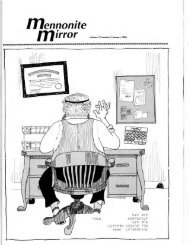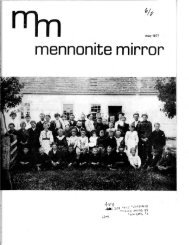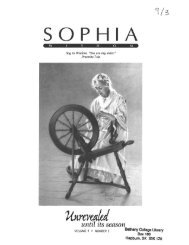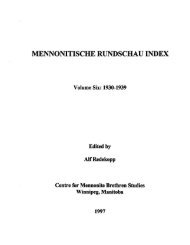• Donwood West opens new retirement option • - Canadian ...
• Donwood West opens new retirement option • - Canadian ...
• Donwood West opens new retirement option • - Canadian ...
You also want an ePaper? Increase the reach of your titles
YUMPU automatically turns print PDFs into web optimized ePapers that Google loves.
OURWORD<br />
Abortion: there are no easy answers,<br />
but compassion must still be part of the solution<br />
F ew decisions by the Supreme Court of Canada have awakened<br />
as much debate as the recent decision which struck down the<br />
existing abortion law, leaving the country with no law at all with<br />
respect to abortion. Five judges out of seven decided that the law<br />
was bad because it created unequal access to abortion. The reaction<br />
of provincial premiers has resulted in even more striking inequities<br />
regarding the right of women to seek abortions.<br />
It is now clear that the federal government will have to move<br />
quickly to pass a law which will be applied equally throughout the<br />
country. We are all called upon to think about the issue and<br />
participate in the debate. There appears to be consensus that there<br />
will always have to be room for some abortions in some situations;<br />
this is where consensus ends.<br />
With the exception of the Roman Catholic Church, which has<br />
always held that nothing must harm the fetus from the moment of<br />
conception, most of us now agree that if a mother's life is in danger,<br />
if conception results from a rape or incest, then abortion is permissable<br />
. Few Protestant churches question the use of birth control<br />
pills, which in effect act as abortive agents flushing the two-week<br />
old embryo from the body. It is clear from these examples that,<br />
given a choice between a life of a mother and that of a fetus when<br />
the choice has to be made, the life of the mother is considered more<br />
important. No one speaks of "murder" when an abortion is administered<br />
under these circumstances, even though this might occur<br />
fairly late in a pregnancy, beyond the critical first trimester.<br />
When is the fetus considered a viable human being with equal<br />
rights to life as a member of society? Opinions range from that of<br />
the Catholic Church (at conception) along the continuum to the<br />
traditional time of "quickening," to the point at which the fetus can<br />
survive outside the womb. The view of British Common Law is that<br />
a human being is someone who has emerged alive from the<br />
mother'S body. If a mother should kill her infant within 24 hours of<br />
giving birth, this act is not considered to be "murder" in the eyes of<br />
the law. Since the Church has no tradition of conducting services for<br />
a fetus or for a stillborn infant, it would appear that this life has not<br />
been considered to have the same value as that of an infant that is<br />
born alive.<br />
The point to be made is that in this area we do make value<br />
judgments with regard to the relative value of life, and the stage at<br />
which fetal life is viable. As Christians, we are called upon to value<br />
and respect the life that God gives to us. As the editor of one<br />
Mennonite paper pointed out, "we are called upon to present a<br />
consistent position to the government with regard to the sanctity of<br />
life." We must also present an honest witness.<br />
The abortion debate is about the balancing of two sets of rights;<br />
the right of women to have control over their own bodies, and the<br />
protection of fetal life. The law and the church have not traditionally<br />
shown any great degree of compassion toward women. Women<br />
who bore children "out of wedlock" or who broke down under the<br />
30/mennonite mirror/april1988<br />
strain of bearing or nurturing too many children have not always<br />
been treated with kindness or humanity, let alone Christian charity.<br />
We must acknowledge that it is women, not men, who still carry<br />
most of the responsibility and burden of caring for children. Do we<br />
as a society, which is presently not always giving sufficient support<br />
to these women, have a right to force them to have children they do<br />
not want? In thinking about this we must acknowledge that within<br />
our own faith community women do seek abortions, have done so in<br />
the past and will no doubt continue to do so in the future. In our<br />
witness to government, we must be honest and acknowledge this.<br />
We cannot expect the laws of society necessarily to reflect all of our<br />
own values and certainly we cannot advocate the ad<strong>option</strong> of rules<br />
which we do not observe consistently ourselves. In a recent.meeting<br />
in Steinbach, Jake Epp suggested to his audience that<br />
"churches must be seen to be addressing the realities of our world<br />
rather then passing judgment on the world as we think it should<br />
be."<br />
If, then, we are to participate in the debate, let us do so with<br />
charity. The charges of "murder" that are being made by the Pro<br />
Life groups have no justification in the history of the law and the<br />
traditions of the church. Women who seek abortions and those who<br />
perform them are not "murderers." Such terms are slanderous.<br />
By all means let us follow the example of the Mennonite Central<br />
Committee in its submission to the Prime Minister, which called for<br />
respect for life but also the establishment of strong support services<br />
and counselling for women with unexpected pregnancies. It is not<br />
enough to insist on bringing every pregnancy to term; the ugly<br />
statistics on child abuse tell us that some parents need as much<br />
nurturing from society as children need from parents.<br />
In the best of all possible worlds, there should be a loving home<br />
for all the children that are born. One of the mysteries of life is the<br />
fact that God's gifts do not fall on all people equally. There are<br />
couples who long for children and are not even able to adopt; there<br />
are many who conceive children they do not wish to have. We can<br />
not solve the agony of those who wish to adopt children by forcing<br />
those who have conceived to carry their babies to term.<br />
In considering our witness regarding abortion we must<br />
acknowledge that even if abortions were made illegal, they would<br />
not be stopped. They would once more be driven underground. Not<br />
all women have the emotional resources to deal with every pregnancy.<br />
It is not just young, unmarried women that seek abortions,<br />
but women in all walks of life, married and unmarried, young and<br />
not-so-young. If abortions become illegal, we would once more<br />
have a situation where the poor and desperate would be at the<br />
mercy of unscrupulous people who could well endanger their<br />
health. Politicians will be hearing from many lobby groups about<br />
this issue. Will they be hearing, from the Mennonite community, a<br />
voice that has some compassion for women and some understanding<br />
of the complexity of this issue? - Ruth Vogt





